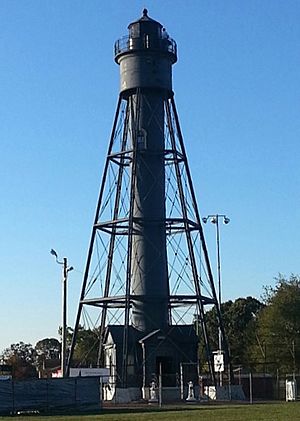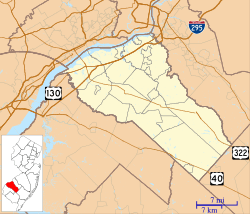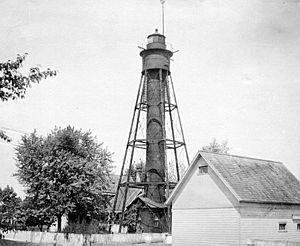Tinicum Island Rear Range Light facts for kids
 |
|
| Tinicum Rear Range Lighthouse, 2013 | |
|
|
|
| Location | 250 feet (76 m) south of junction of Beacon Avenue and Second Street, Paulsboro, New Jersey |
|---|---|
| Coordinates | 39°50′51″N 75°14′24″W / 39.84750°N 75.24000°W |
| Year first constructed | 1880 |
| Year first lit | 1880 |
| Automated | 1933 |
| Foundation | Stone masonry |
| Construction | Iron |
| Tower shape | Hexagonal skeletal tower with a spiral staircase with 112 steps to the lantern room |
| Height | 85 feet (26 m) |
| Original lens | Parabolic reflector |
| Current lens | DCB-24 Aerobeacon |
| Intensity | 500,000 candlepower from 1,000 watt lamp |
| Range | 18 miles (29 km) (within the sight line between front and rear lights) |
| Characteristic | Fixed red |
The Tinicum Island Rear Range Light is a tall lighthouse in Paulsboro, New Jersey. It stands near the Delaware River. This lighthouse is part of a special pair of lights called "range lights." They help guide ships safely along the river channel.
This lighthouse is still working today. It helps boats navigate the Delaware River as they travel near Philadelphia, Pennsylvania. It works with another light, the Tinicum Front Range Light. This front light is also known as the Billingsport Front Light. It is located closer to the river, at Fort Billings Park.
Contents
How Range Lights Guide Ships
Range lights are like a secret code for sailors. They use two lights, one in front and one behind. The Tinicum Island Rear Range Light is the "rear" light, meaning it's farther away from the river's entrance. The "front" light is closer to the water.
Sailors line up these two lights. If they see one light directly above the other, they know they are in the exact middle of the safe channel. This helps them avoid dangers like Little Tinicum Island. It's a clever way to stay on the right path!
History of the Tinicum Lighthouse
The Tinicum Island Range Lights first turned on for New Year's Eve in 1880. When they first started, their light could be seen from about 8.5 nautical miles away.
At first, the lights used oil to shine brightly. But in 1917, they were updated to use electricity. This made them even brighter and more reliable. Later, in 1933, the United States Coast Guard made the lights "automated." This means they could turn on and off by themselves, without a person needing to be there all the time.
Life at the Lighthouse
When the lighthouse was first built, it had a home for the lighthouse keeper. This home had seven rooms. There were also other buildings nearby. These included a brick oil house, a barn, a cow shed, and a chicken house. All these buildings were on a large piece of land, about 4.8 acres.
However, over time, these buildings became old and worn out. They were taken down in the 1950s. Today, only the tall lighthouse tower remains.
A Historic Landmark
The Tinicum Rear Range Lighthouse is very important. Because of its history, it was added to the National Register of Historic Places on September 15, 2005. This means it is recognized as a special place that should be protected.
Visiting the Lighthouse
You can actually visit the Tinicum Rear Range Lighthouse! The Tinicum Rear Range Lighthouse Society offers tours. You can even climb to the very top of the tower. There are 112 steps to reach the lantern room.
Tours usually happen on the third full weekend of each month. They run from April through October. You can also arrange special tours if you plan ahead. From the top, you can see amazing views. You might even spot Philadelphia and its airport in the distance!
 | Toni Morrison |
 | Barack Obama |
 | Martin Luther King Jr. |
 | Ralph Bunche |



